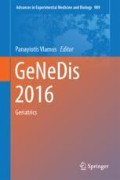Abstract
The power and efficiency of particular quantum algorithms over classical ones has been proved. The rise of quantum computing and algorithms has highlighted the need for appropriate programming means and tools. Here, we present a brief overview of some techniques and a proposed methodology in writing quantum programs and designing languages. Our approach offers “user-friendly” features to ease the development of such programs. We also give indicative snippets in an untyped fragment of the Qumin language, describing well-known quantum algorithms.
Access this chapter
Tax calculation will be finalised at checkout
Purchases are for personal use only
References
Grover, L.K. 1997. Quantum mechanics helps in searching for a needle in a haystack. Physical Review Letters 79(2):325.
Shor, P.W. 1994. Algorithms for quantum computation: discrete logarithms and factoring. In Proceedings of the 35th Annual Symposium on Foundations of Computer Science, 1994, 124–134. Los Alamitos: IEEE.
D-Wave Systems, S. 2016. D-wave 2x. http://www.dwavesys.com/. [D-Wave 2X]
Altenkirch, T., and J. Grattage. 2005. A functional quantum programming language. In Logic in Computer Science, 2005. LICS 2005. Proceedings. 20th Annual IEEE Symposium on, 2005, 249–258. Chicago, IL, USA: IEEE.
Altenkirch, T., J. Grattage, J.K. Vizzotto, and A. Sabry. 2007. An algebra of pure quantum programming. Electronic Notes in Theoretical Computer Science 170:23–47.
Green, A.S., P.L. Lumsdaine, N.J. Ross, P. Selinger, and B. Valiron. 2013. Quipper: a scalable quantum programming language. In ACM SIGPLAN Notices, vol. 48, 333–342. New York: ACM.
Selinger, P., B. Valiron, et al. 2009. Quantum lambda calculus. In Semantic Techniques in Quantum Computation, 135–172. Cambridge: Cambridge University Press.
Van Tonder, A. 2004. A lambda calculus for quantum computation. SIAM Journal on Computing 33(5):1109–1135.
Blaha, S. 2002. Quantum computers and quantum computer languages: quantum assembly language and quantum c language. arXiv preprint quant-ph/0201082
Desmet, B., E. D’Hondt, P. Costanza, and T. D’Hondt. 2006. Simulation of quantum computations in lisp. In 3rd European Lisp Workshop, Co-Located with ECOOP.
Selinger, P. 2004. Towards a quantum programming language. Mathematical Structures in Computer Science 14(04):527–586.
Ömer, B. 1998. A procedural formalism for quantum computing. Tech. rep., Department of Theoretical Physics, Technical University of Vienna.
QUIT Group, I.U. 2016. Qumin language project. https://github.com/wintershammer/QImp/. [Github repositiory, accessed 6/10/2016].
Nielsen, M.A., and I.L. Chuang. 2010. Quantum Computation and Quantum Information. Cambridge: Cambridge University Press.
Ömer, B. 2005. Classical concepts in quantum programming. International Journal of Theoretical Physics 44(7):943–955.
Mlnarik, H. 2007. Operational semantics and type soundness of quantum programming language lanQ. arXiv preprint arXiv:0708.0890.
Sanders, J.W., and P. Zuliani. 2000. Quantum programming. In Mathematics of Program Construction, 80–99. Berlin: Springer.
Moore, C., and J.P. Crutchfield. 2000. Quantum automata and quantum grammars. Theoretical Computer Science 237(1):275–306.
Giannakis, K., C. Papalitsas, and T. Andronikos. 2015. Quantum automata for infinite periodic words. In 6th International Conference on Information, Intelligence, Systems and Applications (IISA), 2015, 1–6. Piscataway, NJ: IEEE.
Author information
Authors and Affiliations
Corresponding author
Editor information
Editors and Affiliations
Rights and permissions
Copyright information
© 2017 Springer International Publishing AG
About this paper
Cite this paper
Singh, A., Giannakis, K., Kastampolidou, K., Papalitsas, C. (2017). Methods and Patterns for User-Friendly Quantum Programming. In: Vlamos, P. (eds) GeNeDis 2016 . Advances in Experimental Medicine and Biology, vol 989. Springer, Cham. https://doi.org/10.1007/978-3-319-57348-9_17
Download citation
DOI: https://doi.org/10.1007/978-3-319-57348-9_17
Published:
Publisher Name: Springer, Cham
Print ISBN: 978-3-319-57347-2
Online ISBN: 978-3-319-57348-9
eBook Packages: Biomedical and Life SciencesBiomedical and Life Sciences (R0)

